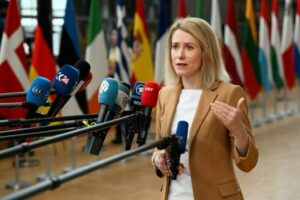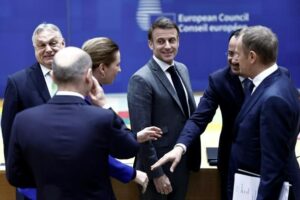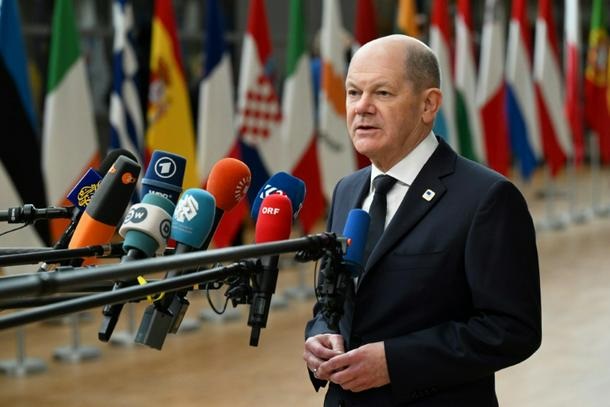EU Takes Action to Arm Ukraine Amid Growing Putin Threat
At a crucial summit in Brussels, EU leaders gathered to address the urgent need to bolster Ukraine’s defense capabilities in the face of an increasingly assertive Russia led by President Vladimir Putin. The summit, held via videolink, focused on strategies to provide essential weaponry to Ukrainian forces while simultaneously fortifying the defense capabilities of EU member states.

As the conflict between Moscow and Kyiv enters its third year, Ukraine’s troops are grappling with a shortage of ammunition, amplifying the challenges posed by the well-equipped Russian military. Ukrainian President Volodymyr Zelensky highlighted the critical need for increased support from Europe, emphasizing the profound impact of the current ammunition shortfall on his country’s defense efforts.
Against the backdrop of a stalled $60-billion aid package in Washington, EU leaders deliberated on a proposal to utilize profits from frozen Russian central bank assets to procure weapons for Ukraine, potentially unlocking substantial funding annually. While the final decision on this financing mechanism was deferred, the EU reaffirmed its commitment to aiding Ukraine, having already allocated over 33 billion euros towards arming the country since the onset of the conflict.
In parallel to efforts to bolster Ukraine’s defense capabilities, the EU is actively strategizing on reinforcing its own defense industry to enhance military preparedness and support Ukraine’s defense requirements effectively. Proposals to expedite defense capacity enhancements have been tabled, aiming to streamline the armament process and ensure Europe is adequately equipped for potential conflicts.

Despite concerted efforts to accelerate defense initiatives within the EU, challenges persist in meeting previous commitments, such as supplying a million artillery shells to Ukraine by the stipulated deadline. Initiatives led by countries like the Czech Republic are supplementing these efforts, underscoring the collaborative approach to addressing urgent defense needs.
EU members remain divided on certain aspects of defense funding, with discussions focusing on leveraging the European Investment Bank to broaden financial support for the defense sector. Plans to expand the bank’s investment scope to encompass a wider range of military and civilian products are under consideration to enhance defense capabilities across the bloc.

While Ukraine’s conflict is a focal point of EU deliberations, efforts to forge a cohesive response to the situation in Gaza have also garnered attention at the summit. Calls for a humanitarian pause in Israel’s offensive have met with mixed responses among EU nations, underscoring the challenges of achieving consensus on complex geopolitical issues.
As the EU charts a path forward amidst escalating tensions and conflicts, the imperative to strengthen collective defense mechanisms and foster unity in responding to global crises remains at the forefront of strategic discussions. The summit reflects the EU’s unwavering commitment to promoting stability and security both within its borders and on the international stage.













































